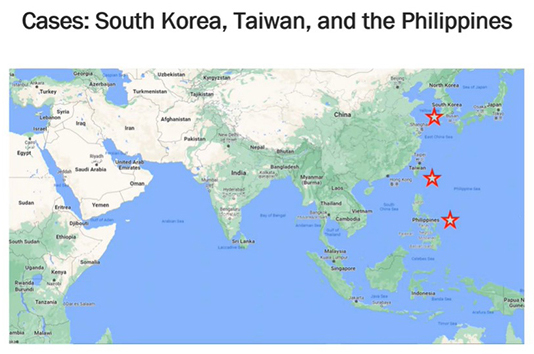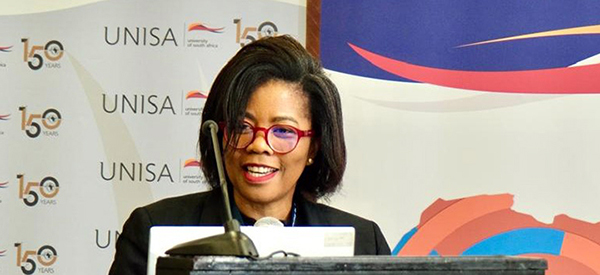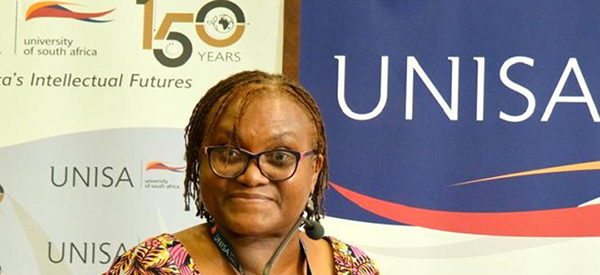
The SARS-CoV-2 virus unleashed a global pandemic (Covid-19). By 14 April 2023, the confirmed infections in Africa were 5 382 790, and the confirmed fatalities were 140 681. The pandemic's impact on Africa's economies varied, being most severe at household level.

2024 Social Policy in Africa Conference delegates
While economic activities have recovered, several countries are faced with rising levels of inflation, cost of living distress, fiscal constraints and, in several cases, rising debt distress.
The DSI/NRF South African Research Chair (SARChI) in Social Policy, housed in the College of Graduate Studies at the Unisa, in partnership with the Council for the Development of Social Science Research in Africa (CODESRIA), the United Nations Research Institute for Social Development (UNRISD) and Open Society-Africa, hosted a Social Policy in Africa (SPiA) Conference.
Intellectual minds from South Africa, Nigeria, Togo, Morocco, Kenya, Uganda, Cameroon, Ghana, Ethiopia, Tunisia, Algeria, Eswatini, Botswana, Namibia, Malawi, Senegal, Zimbabwe, Mauritius, Madagascar, Burkina Faso, the United States of America, Canada, the United Kingdom, Germany, Switzerland and the Netherlands assembled in one space (City of Tshwane, South Africa) from 15 to 17 April to actively engage on the theme, Social policy in post-Covid Africa: In search of an inclusive and equitable architecture.

Prof Adebayo Olukoshi (CODESRIA), Prof Puleng LenkaBula (Unisa), Prof Dzodzi Tsikata (University of London), Prof Thenjiwe Meyiwa (Unisa), Prof Tennyson Mgutshini (Unisa), Dr Katja Hugo (UNRISD) and Prof Jimi Adesina (SARChI Chair in Social Policy, Unisa)
The series of SPiA conferences also serves as a possibility to build not only a network community of social researchers working on health questions and social policy in Africa, but also the successional generation and ongoing excellent research work of the SARChI Chair in Social Policy headed by Prof Jimi Adesina.
"In an era where the rise of Africa is promoted, scanted and contested, I believe that your research for an inclusive economic and equitable social policy architecture will bridge the gaps between theory and practice and ensure that we deliver on the great promise that Africa holds," said Prof Puleng LenkaBula, the Principal and Vice-Chancellor of Unisa, in her welcome address.

Prof Puleng LenkaBula
She urged scholars to be attentive to the socioeconomic and ecological implications that the Covid-19 pandemic would have occasioned. In addition, they should be attentive to the hegemonic impacts of the privatisation of medical care and sometimes the hegemonic ownership of a pharmaceutical intervention that would have been associated with Covid-19.
LenkaBula affirmed that "social policy, as a field of research, is important and necessary to ensure that our continent and the world experiences the knowledge arena to advance human wellbeing not only on the continent but also in the global arena".
"Why has it been so easy for many African governments to unlearn the lessons of the pandemic about the importance of a more expansive approach to social policy and embrace austerity policies that caused so much damage to the social fabric in the past?" This was a reflective and pertinent introductory question by Prof Dzodzi Tsikata from the School of Oriental and African Studies at the University of London, UK, in her keynote address on States of unlearning: Social contracts during and after the Covid-19 pandemic in Africa.

Prof Dzodzi Tsikata
Social contracts ("people living together in society in accordance with an agreement that establishes moral and political rules of behaviour") are useful for thinking about state responsibility and substantive citizenship. They can be applied to thinking about the responsibilities of developmental states in Africa today.
Tsikata said that social contracts need to be renewed daily in light of catastrophic occurrences such as pandemics. Social contracts should address key social questions and be undergirded by the principles of ubuntu: best endeavour, responsibility, democracy, social justice and solidarity.
In looking at opportunities for social contracts during the Covid-19 pandemic, she said the three helpful factors were state responsiveness and the appearance of singular purpose, explicit efforts to mitigate the effects of policies and support citizens, and the fact that the pandemic favoured the technocratic approach, which had become the hallmark of policymaking in the last five decades.
With opportunities come challenges. The Africa Centres for Disease Control and Prevention experienced challenges such as donor dependence, the geopolitics of vaccine nationalism and hoarding, the refusal to suspend restrictive intellectual property rights regimes and the general retreat from multilateralism and solidarity of Western powers.
Tsikata identified several threats to the efficacy of the pandemic social contracts: the deepening of pre-existing political, economic and social crises; the lack of attention to the threat of growing inequalities; the opportunistic use of the pandemic by certain governments to reinforce their control, disarm their opponents and in some cases gain electoral advantage; and the short-term approach to mitigation and support measures.
In looking forward, after the Covid-19 pandemic in Africa, Tsikata said, new social contracts should be based on a feminist ethics of care and the principles of empathy, proximity and relatedness and should prioritise the repair of nature and social reproduction.
"As a community, our research has to support the efforts to fashion social contracts that speak to the lessons of the pandemic and move away from the states of unlearning that doom us to repeat our mistakes over and over again," she stated.
"There is a need for social contracts that provide space for transformative social policies. We need to prioritise social contracts at different levels - local, national, continental and beyond - and forge alliances that promote transformative social contracts."
She emphasised that more robust social contracts in which those excluded have a stake would reduce social conflicts and take a transformative approach. "We also need to privilege measures that speak to the fact that our economies are agrarian, informal and dominated by self-employment, that both production and reproduction are gendered, and that non-state social security systems have a role to play but should not replace the social contract between state and citizens."
In conclusion, Tsikata said that social contracts need to address and mitigate Africa's unacceptable position in the global order.
* By Mpho Moloele, PR and Communications, Department of Research, Innovation and Commercialisation
Publish date: 2024/05/02